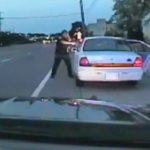 The police officer who fatally shot Philando Castile after a routine traffic stop in Minnesota has been acquitted on all charges. The shooting occurred in July 2016. Officer Jeronimo Yanez had been charged with second-degree manslaughter and endangering safety by discharging a firearm in the shooting. A dash cam video of the incident was released yesterday and frankly it’s hard to watch. There are two excellent articles on the incident, one by David French of the conservative National Review and the other by NY Times reporters Julie Bosman and Mitch Smith. Both are balanced and examine the evidence and the possible circumstances that led to what should be considered a questionable shooting, at best.
The police officer who fatally shot Philando Castile after a routine traffic stop in Minnesota has been acquitted on all charges. The shooting occurred in July 2016. Officer Jeronimo Yanez had been charged with second-degree manslaughter and endangering safety by discharging a firearm in the shooting. A dash cam video of the incident was released yesterday and frankly it’s hard to watch. There are two excellent articles on the incident, one by David French of the conservative National Review and the other by NY Times reporters Julie Bosman and Mitch Smith. Both are balanced and examine the evidence and the possible circumstances that led to what should be considered a questionable shooting, at best.
French writes concerning the video, “If you watch carefully, two salient facts should emerge. First, Philando Castile was quite literally following the police officer’s instructions when he was shot. The officer asked for his license and told him not to reach for his gun. Castile reached for his license while verbally assuring the officer that he was not reaching for his gun. The officer shot him anyway. The second fact overwhelmed the first. The officer panicked. His terror is palpable. The man went from conducting a relatively routine traffic stop to shrieking and firing in a matter of seconds. Part of this is understandable. Life can change in a flash, and when we’re in a state of ultimate distress, few of us can be as composed as SEAL Team Six.”
French goes on to conclude that he knows he the police officer was acquitted. Jurors heard testimony that the officer feared for his life and responded to defend himself. However, the standard is different, as French notes. “Legally, it’s not enough for an officer to show that he was actually afraid for his life. He has to show that “a reasonably prudent person” would also have the same fear. Clever defense lawyers twist this standard into a line of argument that goes something like this: The officer was afraid, and he can explain to you the reasons why he was afraid. Therefore, it was reasonable that he was afraid.”
If you choose to watch the video, it’s clear that the officer’s fear arose out of panic. The officer’s shrieking and lack of control over the situation clearly shows it.
The NY Times piece provides analysis from a number of police experts, criminologists, and attorneys who offer their expert opinion on what happened and who’s to blame. Here are some of the salient excerpts:
“If Officer Yanez had a reasonable belief that Mr. Castile was a suspect in an armed robbery, he should have employed a high-risk car stop, and to do otherwise would be inconsistent with generally accepted police practices.” — Jeffrey J. Noble, a former California police officer who testified on behalf of the prosecution in Minnesota, in a report on Mr. Castile’s death
As the officer arrives at the stopped vehicle, Officer Yanez tells Mr. Castile his brake light is out, and Mr. Castile hands over his insurance card. During the brief conversation, Mr. Castile calmly tells Officer Yanez, “Sir, I have to tell you I do have a firearm on me.”
“That’s where the officer has to freeze it and get everything to stop. Oh, there’s a gun involved now. Let’s reframe the situation and make it safe for everybody.” — David A. Klinger, professor of criminology and criminal justice at the University of Missouri-St. Louis and a former Los Angeles police officer.
“The victim did everything right, everything he was supposed to do. The victim was very respectful, very polite, letting the officer know what he was doing. None of that made a difference.” — Paul Butler, law professor at Georgetown University and former federal prosecutor.
And yet, another young black man is dead as a result of a police shooting. No wonder the community is outraged. This should have never happened. While it’s not clear from the dashcam video if Castile was reaching for a gun as the officer contends, one has to wonder if the victim reached for a gun why would he have told the officer in the first place he had a gun?
“Part of what may have made a difference to the jury was the officer’s very emotional reaction after the shooting. He’s somebody who realizes that he’s made a grievous mistake. It’s certainly an argument for a manslaughter conviction rather than a murder conviction. People who do harm in the heat of the moment still deserve punishment.” — Mr. Butler, former prosecutor.
Perhaps the more important issue is the officer’s temperament and fitness for the job. Not everyone is cut out to be a police officer and shoulder the heavy responsibility of carrying a deadly weapon. In this case, the officer panicked and a young man died as a result. There’s no sugarcoating this one.
